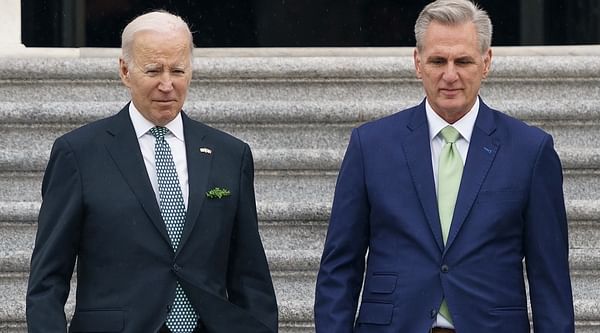Preliminary agreement on the table, US avoids bankruptcy for now
Republicans in the House of Representatives have reached a tentative agreement with the White House to deal with the country's debt ceiling and avoid default.

- Speaker Kevin McCarthy said the deal includes "historic spending cuts" and that he plans to bring it up for a vote in the House on Wednesday.
- President Joe Biden said it "represents a compromise, which means not everybody gets what they want."
"We have an agreement in principle," House of Representatives Speaker Kevin McCarthy said in the Capitol on Saturday. "We still have a lot of work to do, but I believe this is an agreement in principle that is worthy of the American people."
McCarthy said , on Saturday, he spoke twice with President Joe Biden about the plan. "I expect to finish writing the bill, check it with the White House and talk to the president again tomorrow afternoon," the California Republican said, "then I'll release the text tomorrow and vote on it Wednesday. "
The deal, has historic cost-cutting, consequential reforms that will lift people out of poverty and put them in the workforce and limit the reach of government. There are no new taxes and no new government programs.
Biden called the deal "an important step forward that reduces spending while protecting critical programs for working people and growing the economy for all." The deal protects my key priorities and the legislative accomplishments of Democrats in Congress," Biden said, adding that it "represents a compromise, which means not everyone gets what they want."
The White House invited all House Democrats to attend a virtual briefing this afternoon, presumably to explain what's in the deal and urge Democrats to vote for it.
The announcements marked the beginning of a lobbying attack by House and Senate leaders in both parties to persuade their members to vote for the package, which will have to win enough votes in the Republican-controlled House and Democratic-controlled Senate to raise the U.S. debt ceiling in time to meet the June 5 deadline.
At least one senator, Utah Republican Mike Lee, has already threatened to use procedural maneuvers in the Senate to stall the debt ceiling proposal for as long as possible if he doesn't like its contents.
Voting to raise the debt limit does not authorize additional government spending. It merelyallows the Treasury Department to meet obligations that have been approved by Congress in the past, some of them decades ago. However, many Republicans have begun to view the two-year vote to raise the debt limit as an opportunity to extract concessions from Democrats in exchange for their votes to avoid defaulting on the debt.
Republicans are trying to use their influence and the implicit threat of failure to achieve a separate, long-term policy goal. Force the government to cut discretionary spending. In this case, McCarthy wants 2024 base spending to be returned to 2022 levels. Yet he also insists that defense spending - which makes up more than 30% - be insulated from any cuts. That means everything else would have to be cut even further to bring the total back to 2022 levels.
Republicans want approval for a bill that would include, at a minimum, basic cuts in government spending, new work requirements for public assistance, energy permit reform and the elimination of unspent Covid emergency funds.
The latest push for a deal took place yesterday, despite updated guidance from the Treasury Department on Friday afternoon that made June 5 the deadline. McHenry, the chief negotiator praising Treasury Secretary Janet Yellen as "a woman of principle who is true to the law," told reporters that the new date put to rest any lingering questions about when the default would occur. "Now we know, and that puts additional pressure on us to perform," he said.
Yellen explained that the agency had "an estimated $130 billion in payments and transfers " during the first two days of June. In the week of June 5, Treasury will owe "an estimated $92 billion in payments and transfers," Yellen wrote in a public letter to House of Representatives Speaker Kevin McCarthy.
So here we have what we have been waiting for, so it's not quite done yet but it's good news anyway and it will certainly bring more calm to the markets. Anyway, I personally think this will only be temporary as it will bring market growth. Subsequent numbers on the strength of the economy will also rise and with it inflation and that is something that will give the Fed room to raise interest rates. There are already reports on the internet that this is just "pushing back" the problem and the much talked about recession may come in the second half of this year.
It couldn't have turned out any other way :)
At least it's like that. They can't afford not to agree. On the other hand, it's really sad that they have to deal with this. The whole world is running on debt and it's eating me up inside.
That looks good... compromise. Of course, the situation is still not ideal, so at least our stock won't drop 40%. 😁
Only good thing, so hopefully they'll at least seriously reduce that spending. As far as the markets are concerned, that's probably a positive, but the Fed could again put a stop sign by delaying the expected pivot.